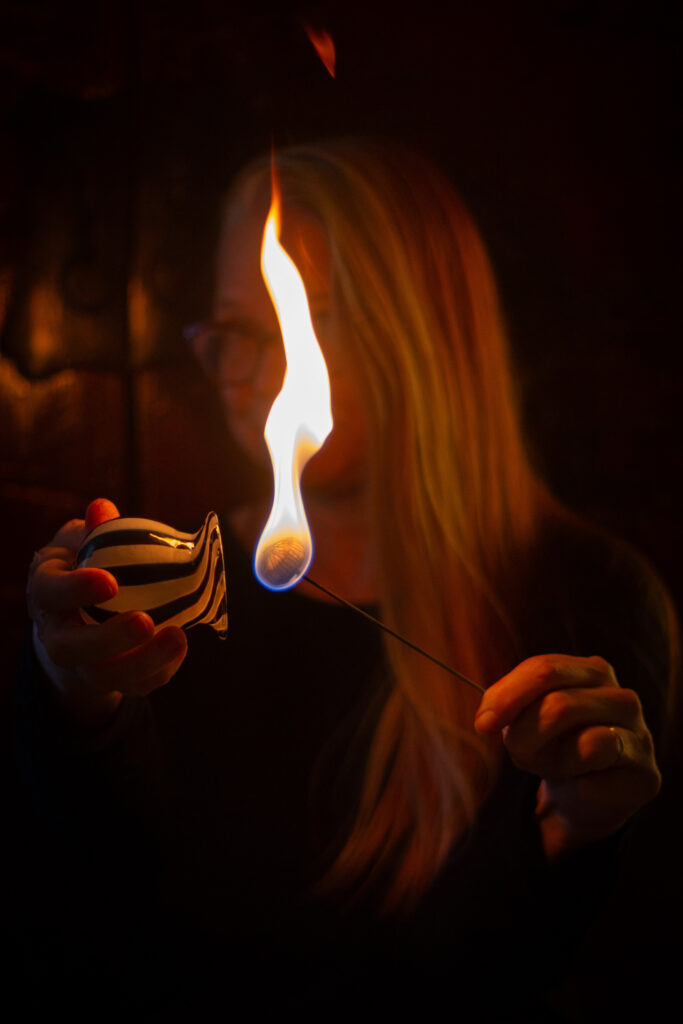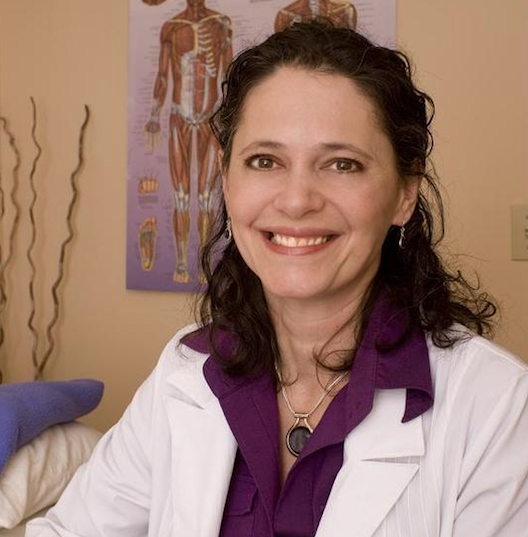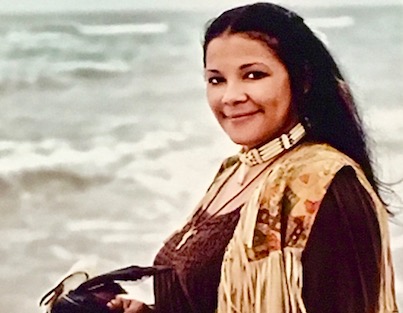Denise Cicuto, L.Ac, Dipl.O.M. helps people live beyond emotional and physical pain. She obtained her Masters of Science and Traditional Chinese Medicine from Yo San University in Los Angeles, and interned with Dr. Daoshing Ni who specializes in fertility. She owns and operates her practice Cicuto Acupuncture as an acupuncturist, herbalist, and alchemist in Ohlone land/San Francisco Bay Area.
Hello Denise Cicuto L.Ac, Dipl.O.M.!
Welcome to the Acupuncturist of the Month interview.
So, how long have you been practicing acupuncture for, and what are your specialties?
I’ve been practicing acupuncture for almost 16 years. My specialties include menstrual health, immune health, and alchemical healing.
What makes you feel inspired about acupuncture?
Acupuncture and Chinese Medicine are really customized to each individual. No two acupuncture treatments are the same. I love that the most about our medicine.
We see that you offer something called Acupuncture Care Kits. Tell us more about these awesome kits and what inspired you to create them!
AcuCare kits are travel kits that help people with self-care on the go. They may include herbs, essential oils, ear seeds, and a moxa stick. I have Immune, Emotional Relief, and Custom AcuCare kits available. I decided to make the kits available because patients were always asking “What should I take with me on my trip?” If the Immune and Emotional Relief kits aren’t quite what they’re looking for, I can create a custom kit which includes a 20-minute telemedicine call to go over what their health concerns are for their travel.
Acupuncture and Chinese Medicine are really customized to each individual. No two acupuncture treatments are the same. I love that the most about our medicine.
-Denise Cicuto, L.Ac, Dipl.O.M.
How does an acupuncture alchemy session differ from traditional acupuncture, and do you find better results with one or the other?
Acupuncture alchemy sessions are typically twice as long as traditional acupuncture sessions which gives us time to focus on something that the patient really wants to transform in their life. They may include acupuncture, herbs, dreamwork, guided meditation, five element healing anointing oils, education cards, healing sounds, flower essences, and some homework.
Share a recent success story you had with a patient. What acupuncture points, herbs, or other interventions (meditation, yoga, nutrition, etc) did you use to help them achieve results?
Someone came in today and said that they were 100% better since their last acupuncture treatment. That doesn’t always happen but I’ll take it! Using acupuncture, herbs, and lifestyle advice (no nicotine), we were able to stop their bleeding hemorrhoids.
You have a world of experience in the eastern medicine field, which work or educational experience do you feel impacted you and your practice the most to get you to the point you are today?
Studying with Lorie Eve Dechar and Benjamin Fox in their Alchemical Healing mentorship really changed the way I approached my practice. The alchemical healing skills I’ve learned from them really help me to help other people live into their Tao. For example, I might treat someone for knee pain and also help them figure out what emotional and spirit level blocks are in the way of their physical healing.
Tell us about your YouTube Channel TCM Talk. What was the inspiration behind creating this channel?
An acupuncturist friend of mine, Kirsten Cowan, and I started TCM Talk to give people self-care tools to use for different conditions. Kirsten and I believe strongly in empowering acupuncture patients with tools they can use to get them involved in their healing journeys.
On your journey to become an acupuncturist, what obstacles did you face and how did you overcome them?
The first thing was realizing that Chinese Medicine requires a different way of thinking about healing. It took the first year of acupuncture school to really understand that. I’m sure other acupuncturists can relate to that! When I started my private practice, the challenge was to explain what I learned in school so that people could understand it without having gone to acupuncture school.
Learning how to do an ‘elevator pitch’ was useful and having to do it in a business networking meeting every week with professionals in different fields has really helped. I’ve been in BNI (Business Networking International) the whole time I’ve been in practice mostly for that experience. It makes me explain Chinese Medicine to people in a way that lay people can understand it.
Looking back, what advice would you have given to the younger version of yourself, who was just getting started in this profession?
I would advise myself to listen to the acupuncture teacher who told us to schedule time off ahead of time. It’s so important that we have time to rest and recharge. Oh, and I’d tell baby acupuncturist Denise that the end-of-year holiday time is slow and it has nothing to do with her. Maybe she should take some time off then!
What keeps an acupuncture practice going?
Determination, devotion, keeping up with day-to-day tasks (like responding to emails and ordering herbs and supplies) are the main things.
What are specific roadblocks to watch out for as a new acupuncturist?
Imposter Syndrome and self-doubt can be big roadblocks. Burnout can also happen if you don’t prioritize your own self-care.
What are your favorite acupuncture points, and why?
Oh gosh, that’s hard! I love Stomach 36 as my ‘deserted island’ point. If I were on a deserted island and only had a few needles. I’d choose Stomach 36 for the breadth of what it can treat – low energy, digestive issues, depression and more. Liver 3 is a great point for the ‘I don’t wanna’s” because it helps to motivate people. Kidney 1 is sometimes hard to needle but even with acupressure and essential oils it is super calming for someone who is experiencing a lot of fear.
Tell us about some herbal formulas and foods you find yourself consistently recommending to your patients, friends, and colleagues. What makes these herbs/foods so helpful?
The ones I recommend most often are most likely in one of my AcuCare kits! I would recommend a version of Gan Mao Ling and Yu Ping Feng San to anyone traveling. If they have a weaker immune system, Yu Ping Feng San before travel and with Gan Mao Ling during travel will help you stay healthy. A version of Bao He Wan is essential to keep your digestion on track (and I recommend gluten-free versions for people who need them).
I love Xiao Yao San and its different variations for emotional balance. This is as hard as choosing favorite points! As for foods, I recommend to anyone to be mindful of the four whites: White flour, salt, sugar, and dairy. I don’t usually tell people to quit those foods but to remember everything is best in moderation, especially if they have pain of other inflammatory conditions.
The COVID-19 pandemic has without a doubt had a significant impact on the acupuncture practice community and small businesses alike, and while it’s on the mend, we are still navigating through the new normal. How has COVID-19 changed your practice?
The COVID-19 pandemic has been such a big challenge. It was humbling to have to take out disaster loans to stay in business. But then I felt uplifted and so supported by the people of Alameda who contributed to the Alameda Strong grants so that small business owners like myself didn’t have to close.
I have kept the half hour break between appointments that I needed at the beginning of the pandemic to clean the rooms. I like the slower pace and I have continued to only see one patient at a time, which I returned to at the beginning of the pandemic.
I am still masking and asking my patients to continue to mask when they come in for their appointments. I see wearing masks and getting vaccinates as acts of community care.
Sometimes, the best resource for improving our skills is by learning from the other acupuncturists we meet along our professional journey. What is one thing you learned from a fellow acupuncturist or holistic practitioner that has helped you in your professional growth, or in your care for patients?
The most valuable skill I’ve learned is listening to patients. And that’s not just with my ears. It’s about being present and holding space for them while they share their troubles and really their souls with me. It’s an honor to be a witness to my patients’ healing journeys.
Describe your experience with telemedicine visits. Is this a service you began offering at the start of COVID, and do you see this service becoming more popular amongst healthcare providers?
Yes, I started telemedicine visits at the start of COVID. They enabled me to treat my patients when they couldn’t come in for acupuncture. I wanted them to be able to continue their care. And because I have always emphasized self-care, I felt like it worked naturally with telemedicine. It also enabled me to help people who had COVID. I did many telemedicine visits and herb deliveries for patients early on, especially before vaccines were available. I do think it’s more popular for healthcare providers. And I’ll continue to offer it for patients near and far (in places where I’m licensed) if they can’t come in for acupuncture.
Do you have any daily habits or rituals that keep you at your “best-self”, both as an acupuncture practitioner and person?
I do yoga and/or meditation almost every day. I try to spend the first hour of my day completely offline. I only respond to emails during my business hours. And I let my patients know that I try to stay away from my electronic devices on my days off. I also try to bike to work on Alameda as much as possible.
The kindest thing a patient said to you recently:
‘I was so rattled this morning and [after acupuncture] I feel back together again in my body.’
The funniest thing a patient said to you recently:
‘I’m a burrito’ – when they were snuggled under a Mylar blanket during acupuncture.
As an acupuncturist, what are you most proud of thus far in your professional journey?
I’m most proud of being in business for almost 17 years!
If you could have a billboard with anything on it, what would it be and why?
Maybe: “Acupuncture can help you find your own way.” That’s in a nutshell what acupuncture does. It helps you become the best version of you.
What is your definition of success?
Kind words from patients; helping people move beyond emotional and physical pain; being able to greet each day with curiosity and wonder and appreciation for this unique life.
If you could have one superpower what would it be and why?
To make people to be kind to one another.
*Rapid fire questions! *:
Morning or night? Night
Tea or coffee? Tea
Sun or moon? Moon
Cupping or Tui na? Cupping
Yin or Yang? Yin
Meditation or exercise? Both
Instagram or Facebook? Instagram
Top 3 Favorite Books? Anything by Seanan McGuire
Favorite Animal? My cat Cotton
Where can other licensed acupuncturists, students, and patients go to learn more about your work?
Cicuto Acupuncture
Instagram: @cicutoacu
AcuCare Kits: https://www.cicutoacupuncture.com/acucare



